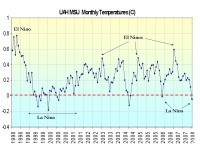By Dr. John R. Christy
I have been flooded this week with calls and e-mail messages concerning a story that has appeared on various Internet sites, in which the claim is made that cooling global temperatures over the past twelve months in some way negate or eliminate any global warming that might have happened over the past 100 years.
“Here is my perspective on this issue: Twelve months of data does not make a trend, especially in a system as complex and slow moving as global climate, and even more so when the cause for that short-term cooling is as reasonably well understood and well documented as a switch from a minor El Nino Pacific Ocean warming in January 2007 to the La Nina cooling event now taking place.
“The 0.59 C drop we have seen in the past 12 months is unusual, but not unprecedented; April 1998 to April 1999 saw a 0.71 C fall. The long-term climate trend from November 1978 through (and including) January 2008 continues to show a modest warming at the rate of about 0.14 C (0.25 degrees F) per decade.
“One cool year does not erase decades of climate data, nor does it more than minimally change the long-term climate trend. Long-term climate change is just that “long term” and 12 months of data are little more than a blip on the screen.”
Dr. John Christy is Professor of Atmospheric Science and Director, Earth System Science Center, The University of Alabama in Huntsville
Icecap Note: Certainly John is absolutely correct that we can’t make too much of one year’s change either up or down. The story he referenced focused on the Hadley CRU land and ocean based data. John Christy, Roy Spencer and Phillip Gentry are using satellite derived lower tropospheric data. Satellite is widely recognized as the most accurate method for the assessment of change. The following plot of the last decade of the satellite derived global temperatures shows how the global climate is strongly influenced by El Nino and La Nina as John notes.

See larger image here
As this La Nina weakens, temperatures will very likely rebound. The important issue is whether the Pacific Decadal Oscillation which has descended into its negative cold mode stays there. That would mean less “warm” El Ninos (which have dominated the satellite data set period, because it was mainly in the warm PDO phase which favors El Ninos) and more “cool” La Ninas. This would logically reduce or reverse the longer term trend in temperatures over the next few decades. Download blog pdf here.




